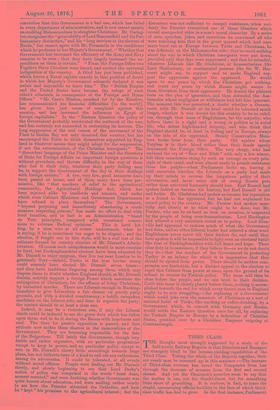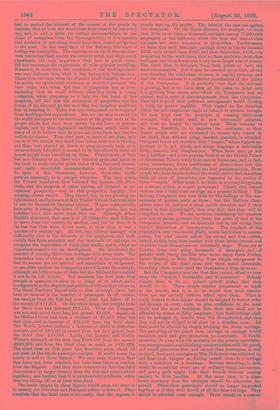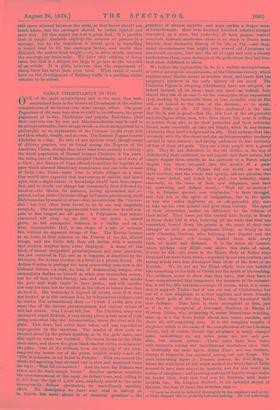THIRD CLASS.
THE thought most strongly suggested by a study of the .1 half-yearly Railway Reports is that Directors and Managers are strangely blind to the income-yielding capabilities of the Third Class. Taking the whole of the Reports together, their net result may be summed up in this sentence :—The increase of Third-class revenue has saved the Companies from loss through the decrease of revenue from the first and second classes. And yet the Chairmen's speeches seem to say that the matter is one, not for thankfulness, but for something little short of grumbling. It is curious, in fact, to trace the stupid, unreasoning official hostility in the face of which third- class traffic has had to grow. In the first instance, Parliament had to protect the interests of the masses of the people by insisting that at least one third-class train should be run every day, and to add a bribe for further accommodation in the shape of exemption from the Passenger-duty, or it is possible that facilities of travelling would have been denied altogether to the poor. In the early days of the Railway, this state of feeling was intelligible. The experiment on which Shareholders were venturing their money was entirely novel, and stage-coach experience, the only experience they had to guide them, did not eneourage the expectation of wide popular travelling. Moreover, in those days, the condition of the working-classes was very different from what it has fortunately become now. Those were the days when the Premier could describe in one of his novels the agricultural labourers as so-called peasants who burn ricks, and when the fear of pauperism was so over- mastering that he could without absurdity make a young nobleman, while proposing to a lady for the hand of her daughter, tell her that the extinction of pauperism was the dream of his life, and he felt sure that her daughter would aid him in realising it. There was not, then, much to be expected from working-class expenditure. But we can only account for the stolid disregard to the convenience of the great body of the people which has since been shown by the force of precon- ception, and by that ingrained snobbishness which leads so many of us to believe that no good can come from any but the well-to-do classes. Year after year, on most of our lines, only one or at the outside two third-class trains were run in the day, and these were started at hours so preposterously early or so inconveniently late, that it seemed to be the object to deter all decent people from travelling by them. Furthermore, if they had any distance to go, they were shunted again and again on the road, to make way for quick trains of the favoured classes; and lastly, reasonable accommodation was denied them. In spite of this treatment, however, third-class traffic grew so amazingly as to compel attention. The long peace, the Liberal legislation that followed the Reform Act, Free- trade, and the progress of other nations, all fostered an ex- ceptional prosperity,—and in this prosperity, happily, the working-classes shared. They shared, too', in the growing en- lightenment, and by means of their Trades' Unions they were able to win for themselves increased leisure. Wages, consequently, have gone on rising, the hours of labour have grown less, and holidays have once more come into use. Although Adam Smith's statement, that man is of all things the most difficult to move from one country to another, may yet be true, it is far less true than when it was made, or even than it was a quarter of a century ago. At last, one railway manager was sufficiently alive to the interests of his employers, and suffi- ciently free from prejudice and the trammels of red-tape, to recognise the importance of third-class traffic, and to adopt an important measure for its development. lie introduced the practice of running third-class carriages with every train. The innovation was, of course, most distasteful to his competitors. But its success was too marked and immediate to be ignored, so one after another the Companies have followed the example, although we believe none of them but the Midland have carried it out in its full extent. The measure has now been long enough in operation to allow us to judge of its effect, and a few figures from the Reports just published will set that before us. The Great Northern Report tells us that although there had been an increase in the number of passengers by all classes, the receipts from the first and second class had fallen off to the extent of £11,674. On the other hand, the receipts from the third class had increased £16,533. Thus the Company was not only saved from loss, but gained £4,859. Again, on the Midland there had been a decrease of £1,533 from the first class, and an increase of £32,160 from the third class. The North London suffered a decrease of £880 in first-class receipts, and of £20,565 in second class, but they gained from the third class £24,504. Lastly, the London and North- Western earned from the first class £320,667, from the second, £239,825, and from the third class as much as £819,829. The third class on this great line, therefore, earns about 60 per cent, of the whole passenger receipts. It would weary the reader to add to these figures. We may state, however, that they have not been selected, but have been taken at random from the Reports. And they show conclusively that the third class earns a far larger revenue than the first and second added together ; and further, that it is progressively profitable, while they are falling off, or at least stationary.
The lesson taught by these figures would seem too clear to be missed, yet Directors and Managers refuse to learn it. They complain that the third class is too costly, that the expense it
entails eats up the profits. The facts of the case are against the complaint. On the North-Eastern, for example, we leant that little more than a thousand carriages convey 17,000,000 passengers in the half-year, while the first and second-class carriages are more numerous in proportion. Furthermore, we learn that each first-class carriage earns in the six months £343, each second-class, E325, and each third-class, £450,—in proportion to the work done, that is, there are fewer third-class carriages, and those fewer earn every much larger sum of money. The third class is therefore, from both points of view, the most remunerative. But it may be retorted on us that, on our own showing, the third-class revenue is rapidly growing, and that the circumstance is a sufficient justification of the policy of the Companies. It is perfectly true that the revenue is growing, but as we have been at the pains to point out, it is growing from causes over which the Companies had no control, and in spite of discouragement from the Companies. That fact is proof that judicious management would develop it with far greater rapidity. With regard to the direction which the encouragement ought to take, it is evident enough. We may hope that the principle of running third-class carriages with every train is now universally adopted, and need no longer be insisted upon. What remains to be done, therefore, is to improve the carriages, so that decent people who are straitened in means may travel in the third class without being shocked, insulted, or offended. Our great towns are crowded with "roughs," whose highest en- joyment is to get drunk, and whose language is habitually filthy, obscene, and blasphemous. When these men go out for a holiday—and every popular festival at the Crystal Palace or Alexandra Palace, every boat-race or horse-race, and in fact, every amusement, draws multitudes of them—they turn the railway-carriages in which they are into pandemoniums. Even people who have knocked about the world, and rubbed shoulders. with all sorts of characters, are disgusted by the society of these "roughs." What must it be, then, to a young clergyman, or a decent widow, or a poor governess? Clearly they cannot venture into a third-class carriage on a popular holiday. The Railway Companies may care little for the feelings or the con- venience of persons such as these ; but the Railway Com- panies, after all, perform a great public function, and if they answer in that cynical spirit, they may find that they will be compelled to care. We are, however, considering the question now not on public grounds, but from the point of view of the Companies' interests, and we maintain that by not caring they convict themselves of incompetence. The numbers of the respectable poor who would gladly travel third-class to amuse- ments, but who cannot afford the second and first—often, indeed, shrink from close contact with those better dressed and wealthier than themselves—is extremely large. There are in London alone very many thousands of shop-girls and of parents with young families who never enjoy Good Friday, Easter Monday, or Whit Monday from simple repugnance to the society of the third class, and these many thousands, travelling often, would yield the Companies a large revenue.
But the Companies may say that they cannot afford to turn away the "roughs," drunkards, and ill-mannered. Nobody expects them to do so ; indeed, nobody wishes that they should do so. These people require amusement as much as the decent, and it is to be hoped that good associa- tions are not entirely without effect upon them. What is really desired is that means should be adopted to ensure order and decency in every train, to give confidence to the most timid and the most fastidious that their ears shall not be offended by coarse or filthy language • that their feelings shall not be outraged by insults from the ill-conducted, and that they will not be obliged to sit close by a drunken man. All- that could be effected by simply adopting the Swiss carriage. The patrolling of the guard from carriage to carriage would maintain order and give protection to everybody. It would, moreover, do away with the necessity for the present unsatisfac- tory arrangement for establishing communication with the guard, and would guarantee first and second-class passengers, as well as third, from such outrages as Miss Dickenson was subjected to, and from such dangers as finding oneself alone in a carriage with a murderer or a madman. Railway travelling, in fact, would be as safe for every one as ordinary social intercourse, and young girls might visit their friends without causing anxiety to their families. At the same time, it is abso- lutely necessary that the carriages should be otherwise im- proved. Third-class passengers should no longer, be packed together as if they were devoid of all the finer feelings. They should be afforded room enough. There should be a reason- able space allowed between the seats, so that -knees should not touch knees, and the carriages should be better lighted and more airy. All this would not cost a great deal. It is possible that it might diminish slightly the number of persons in a carriage, but by the impulsion it would give to travelling it would tend to fill the carriages better, and would thus diminish the useless dead-weight,—or, in other words, increase the earnings per train-mile. We have said nothing of cheap fares, but that is a subject too large to go into at the very end of an article. It is plain, however, that the experiment of cheap fares has never been even tried. What result it would have on the development of Railway traffic is a problem which remains to be solved.




































 Previous page
Previous page